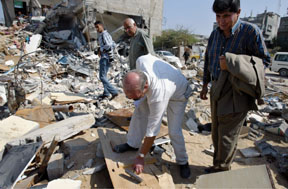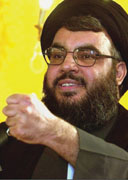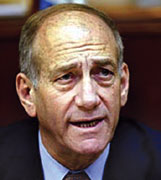|
observer |
|
|
|
|
|
OTHER LINKS |

|

|

|
Israel seeks hint of victoryIsrael's move to greatly increase its ground forces in Lebanon a day before it is expected to accept a cease-fire has two goals: to damage Hezbollah as much as possible and to conclude the conflict with something that could be called a victory for an Israeli government under domestic pressure.
In this last army push, which many here regard as too late to make a big difference, Mr. Olmert wants to ensure that the Iranian-backed militia and its stockpiles are at least cleared out of southern Lebanon. The hope is that inhabitants of the north will be able to return home or emerge from bomb shelters without the daily fear of rocket fire. The Israeli cabinet was scheduled to meet Sunday to discuss a United Nations Security Council resolution calling for a cease-fire. But the Israeli Army will be pressing forward if not beyond, trying to destroy Hezbollah rockets and assets. That is a task that Israel does not believe the Lebanese Army, even accompanied by an expanded United Nations force, will dare to do. Mishandling the war
Mr. Olmert and his defense minister, Amir Peretz, have been wounded by the perception that they mishandled the war and were overly reluctant to commit sizable ground forces when there was enough time to accomplish the government's stated goals. The life of the government is likely to have been shortened. The debate in Israel has not been over the war's legitimacy - that is widely accepted. The attacks on the government have been over its handling of the assault. In a familiar pattern of backbiting - the best indication that the war has not gone well - the army leadership is complaining that the politicians did not let the military do its job, and the politicians are complaining that the army promised that the task could be accomplished in a week or two and largely with air power. As usual in Israel, the army is more popular than the politicians, and it is bound to win the argument. But the army's performance against Hezbollah will lead to considerable introspection and criticism about failures in strategic analysis, intelligence, training and preparedness, especially among the reserves. There will also be sharp criticism of governmental preparedness, with the image of many thousands of poorer Israelis huddling for a month in decrepit bomb shelters with inadequate public services and supplies. Mr. Olmert, who leads the centrist Kadima Party, is going to face a postwar onslaught from the right, in particular from Benjamin Netanyahu. Mr. Netanyahu, the Likud Party leader, favored a major military operation to destroy what he called "an Iranian army division" fighting in "a war conceived, organized, trained and equipped by Iran, with Iran's goal of destroying Israel and its fantasy ideology of building a once-glorious Muslim empire in which we are merely the first pit stop." There is more of this talk to come, and from another rival on the right: Avigdor Lieberman, who is already very popular among the Russians who make up a large number of the Jewish Israelis living in the north, many of whom were too poor to seek shelter in southern towns. Mr. Olmert's plan to extend the policy of unilateralism by removing up to 70,000 Israeli settlers from the West Bank, behind the separation barrier, also appears moribund. The rocket wars have made the barrier look flimsy, and one year after Ariel Sharon and Mr. Olmert pulled 9,000 Israeli settlers out of Gaza unilaterally, many onetime supporters of the plan say that critics like Mr. Netanyahu appear to have been correct - that the disengagement provided little security or stability. The plan to hand over more territory in the West Bank to a Hamas-led Palestinian Authority that could use more sophisticated rockets to hit Tel Aviv is now being dismissed as folly by many in the center, not just on the right - an unexpected gift to the settler movement. "A year after the withdrawal of Gaza, there is a huge 'I told you so' hanging in the air, and it's hard to argue with, when Qassams are still flying out of Gaza and nothing has moved forward," said Tom Segev, an Israeli historian. "Like Oslo, Gaza disengagement was a good idea, but it was managed very badly. But instead of criticizing the management, we criticize the thing itself." Itamar Rabinovich, a former ambassador to Washington, said bluntly: "Two notions have died. First, unilateralism, and second, separation by the fence. Missiles dwarf the fence." Israelis also fear there has been damage done to their relationship with the United States, where some may complain that the Israelis were given time to clobber Hezbollah and did not get the job done. Mr. Rabinovich is more sanguine. "Part of the reckoning will be our reputation as a strategic partner, when we tell the Americans, 'Give us the tools and we'll do the job,'" he said. "Part of our self-image is of military miracle workers, and we didn't do that this time." Still, he said, Lebanon reinforces Israel's view that the real danger in the region is Iran, Hezbollah's patron, and that the threat of a nuclear-armed Iran is aimed at Egypt, Saudi Arabia and Jordan too. For Mr. Segev, the Lebanese war seems like a side show to Israel's main and persisting problem: the Palestinians. Israel still faces a crisis in Gaza, including the unknown fate of a soldier captured June 25, and unresolved disputes over the Hamas-led government. "This war is a huge detour from the real problem, like an accident that shouldn't have happened," Mr. Segev said. "The Palestinian problem persists, and again the government looks to be bad managers." (New York Times) |
 Having begun the war by proclaiming that the aim was the destruction
and disarmament of Hezbollah, Prime Minister Ehud Olmert will be able to
claim only that Hezbollah is badly hurt and, with the help of
international troops, effectively restrained - even without the robust
new international force or disarming of the militia that Israel
initially demanded.
Having begun the war by proclaiming that the aim was the destruction
and disarmament of Hezbollah, Prime Minister Ehud Olmert will be able to
claim only that Hezbollah is badly hurt and, with the help of
international troops, effectively restrained - even without the robust
new international force or disarming of the militia that Israel
initially demanded. 









